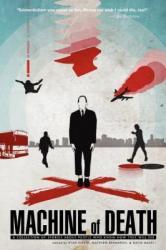
The concept is simple: a machine takes your blood and spits out a card with the means of your demise printed on it. In this collection of short stories, a variety of authors explore what this truly means for individuals, as well as society as a whole. Based off an idea by Ryan North (author of “Dinosaur Comics”), this anthology has plenty of different approaches to the concept that a machine could predict how a person will die. However, many of these ideas hit upon the same concepts and social implications, making the whole thought exercise seem redundant by the end of the book.
Part of me felt the idea itself was a little derivative of Death Note, but with a more ambiguous set of constraints. Each of the short stories included in this anthology had some unique twist on the idea, ranging from humor to romance to horror. Still, every author tended to agree: a machine of death would bring about a dystopian future in some form or other. From governments requiring a “death reading” to mitigate any national disasters to a school needing to know how their prospective students will die so they can save face, the real enemies of this idea tended to be the bureaucracies of humanity.
While I honestly enjoyed the stories included in this anthology, they all seemed to suffer from the “a priori problem.” With each story titled with some way to die, you half-expect the story’s main character to end via that method. The intrigue is more in the how and when; thus providing interest to the story despite practically knowing the ending before it even starts. Granted, that’s part of the appeal of the machine: the ambiguity is as freeing as it is constraining.
A morbid set of interesting short stories, I give Machine of Death 4.0 stars out of 5.
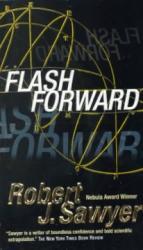
As time marches on, predictions of the future made in the past are tested against reality. In 1984, we didn't have George Orwell's dystopian government. In 2001, we didn't have Arthur C. Clarke's interplanetary travel. Sure, these authors did have a few interesting ideas that did come true, eventually. Still, they were writing well before the events in their books would come to pass. Robert J. Sawyer's Flashforward did not have that luxury. Written in 1999, Sawyer only imagines a future set a decade in the future. For those keeping track at home, Flashforward takes place in 2009, with a vision of a future 21 years ahead of that. Since 2009 has come and gone, there were a few things Sawyer got right, but many he could not have predicted.
The crux of this story is similar to that explored by Machine of Death: everyone in the world gets a glimpse of their future in 2030, thus causing everyone to react based on what they saw. Some were encouraged by what they saw, others despondent and suicidal. The people who had negative visions hoped the future could change, especially if their lives were on the line. Many of the "effects" of the look into the future were logical conclusions, which added an amount of interest to the story but with a cheap cop-out to keep from killing off all the characters. With all the different characters and POVs, it was somewhat difficult to follow along each time the
focus changed, since there was nothing to indicate a change of view.
I also appreciated the conversation this book had in regards to science and the many existing theories about the future. While this exploration of science also included the discovery of the Higgs Boson (which didn't happen until 2012), I was continually distracted by the narrator's pronunciation of "CERN," which sounded more like "sairn" instead of how I thought it was pronounced ("sirn"). I did appreciate the narrator's ability to mimic multiple accents, but that one pronunciation threw me.
A recent book about the "future" that gets a few things correct, I give Flashforward 3.5 stars out of 5.
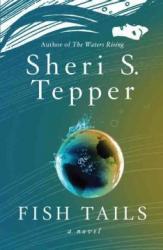
I decided to choose the book because it looked like it would tell a great story and it did. I liked the book due to its great lessons inside about the imperfections of our minds, but the greatness of them too. The part I enjoyed most was the journey f the main characters and how they didn't change their personalities and stayed focused on the topic. The part I didn't really enjoy was that the story went kinda slow. The book was pretty predictable, but the lessons and thoughts behind you need to think more about to get, so it was still entertaining to read. It was an amazing book to read and I definitely recommend it.
Reviewer Grade: 10
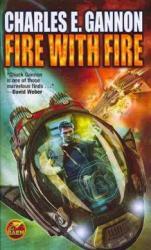
I’m not sure which is more boring in a book: a plot that doesn’t go anywhere, or a main character who is perfect. Unfortunately, Fire with Fire has both. I’ll first start with my qualms about the plot. This story started way too late, as it didn’t get interesting until halfway through.
Even when it did finally get interesting, it suddenly became bogged down in committee. Seriously? Didn’t we learn anything from the Star Wars prequels?
Adding politics to a story about traveling across space merely makes it tedious. This is also not to mention how heavy and clunky the exposition is, with almost every chapter being filled with information that isn’t important, and the jumps between chapters needing way more explanation.
Secondly, let’s take a look at “Mr. Perfect,” Caine Riordan. Aside from the egregious fact that the POV switched between 1st person and 3rd person within most of the paragraphs of his section (with no italics or indication that we were suddenly in Caine’s head), I felt this character was just the author’s way to show how smart he is. With the expansive repertoire of high-value vocabulary words and a character that always knows what to do all the time and has all the correct answers, I ended up not caring about any of it by the end. And I haven’t even mentioned the blatant and pervasive misogyny either.
Even the rest of the supporting cast was so flat and one-dimensional that I probably couldn’t tell you who they were or what their defining characteristics were (aside from that one mysterious guy who LOVED olives and feta cheese). Most of the time I was reading this book, I kept wondering, “Wait . . . what?” as what seemed to be major plot points were introduced then almost immediately forgotten until hundreds of pages later. I’m not sure how this book managed to get a series tacked on to it, or how it was even nominated for a Nebula Award, but it gives me encouragement that I could write something way better than this.
Antiquated sci-fi tropes in a recently written book, I give Fire with Fire 2.0 stars out of 5.
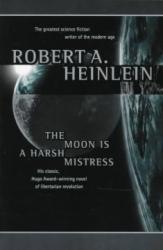
Certainly well ahead of his time, Robert A. Heinlein remains one of the definitive writers of the science fiction genre, even today. In The Moon is a Harsh Mistress, Heinlein covers such topics as artificial intelligence, extraterrestrial colonization, and interplanetary warfare. Even today, most of these subjects are accurately depicted in the narrative, even if some of the technology has advanced past where it was thought to be in 1965. Part of me is almost jealous at Heinlein’s ingenious use of Earth’s gravity well, and I know any attempt I might make to replicate the idea will merely seem derivative in comparison.
As is the case with some of his other works, Heinlein makes many socio-political statements via his writing. His stance on taxes, revolutions, and independent governing bodies is a critical section of the plot in The Moon is a Harsh Mistress, and I can certainly see the theoretical benefits he puts forth in this context. That being said, his views on polygamy and polyamorous relationships are certainly on display again, with his previous work, Stranger in a Strange Land exploring these themes in greater detail. I can only assume the "free love" culture of the 1960's shaped these opinions.
Overall, the book wasn’t quite what I expected. The initial chapters made me hope the plot would center on the relationships between man and artificial intelligence (AI). If anything, AI is shown to be a powerful tool that can influence society in ways we can’t even begin to comprehend. At the very least, the main character was quite entertaining, if not hard to understand at times with his “accent.” If we do eventually colonize the moon, I can hope we do so peacefully and in a way that doesn’t lead to an uprising of its native inhabitants. After all, I do like living in a Colorado Springs devoid of meteoric bombardment.
A well-thought out sci-fi story decades ahead of its time, I give The Moon is a Harsh Mistress 4.0 stars out of 5.
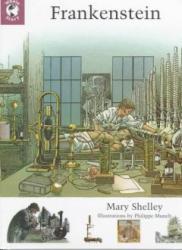
Frankenstein was a disappointment to me. As per the Romantic period, this novel used lots of scenes in nature to explain the characters’ emotional states. I do not mind a few good cries in a storm, but this novel borders on incessant outdoor melodrama. I decided to disregard both the plot and the setting in a vain attempt to enjoy the novel. I would only focus on the characters. As this was written by a female author, I looked forward to the female characters, which were awful. One, Justine, is a servant and seems only to exist in order to die. Elizabeth, who also seems to share this quality, is regarded as an object to be owned in a creepy incestuous manner by her cousin; she is apparently superior and virtuous only because of her noble birth. So, I dismissed the female characters to focus on the males, none of which were believable. Victor, his friend Henry, and his monster all were overly emotional, and they inspired no sympathy from me. With no likable characters and emotions running everywhere, I would only read Frankenstein if required.
Reviewer Grade: 9
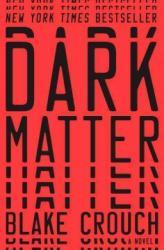
It seems to me that the multiverse is a popular topic in fiction today. Sure, there have been plenty of stories about parallel universes and the fractal branching of our decisions, but for some reason, there’s been an uptick in the number of these stories lately. Perhaps these stories are trying to find a better universe in which to live, or perhaps they’re trying to show us that the world we have could be much worse. Either way, Blake Crouch’s Dark Matter nails the multiverse plot by exploring all the different connotations of the ability to travel between parallel universes.
Presented in a traditional, three-act narrative, Dark Matter thrusts its protagonist into another version of his reality, ripping him away from his idyllic life. Using quantum physics as a form of magical hand-waving, the narrative then turns to the main character’s relentless search for his original universe. While the result of this exploration fits nicely into the book’s natural third act, I almost would have liked to see something a little different and less predictable. Still, all three acts are entertaining as a breathless thriller driven by the emotions and resolve of the main character.
The best part about Dark Matter is how it fleshes out all the consequences of being able to travel between parallel dimensions. It’s not nearly as simple as an It’s a Wonderful Life (1946) “you-never-existed” storyline. That being said, I do question why the “original” main character had the perfect life, especially if many of the other parallel universes seemed to have relatively close representations of the life he was trying to return to.
But, in the end, the narrative is driven by the characters, and these characters are well-developed and exciting to follow.
A multi-dimensional thrill ride, I give Dark Matter 4.5 stars out of 5.
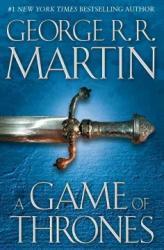
This book blew my mind. A Game of Thrones is the first book in the series A Song of Ice and Fire. These books are fantasy, and they follow the wars, events, kingdoms, and lives of the people of Westeros. This book is extremely dense, but that only means that it is full to the brink of background information and interesting tidbits about the world. The most amazing thing about this book is how developed the world is. Martin must have put an unimaginable amount of time into world-building, and this effort certainly shows. The plot is so complex, and almost all of the characters are wonderfully 3-dimensional.
Reviewer Grade: 11
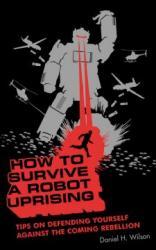
As a precursor to Robopocalypse , How to Survive a Robot Uprising: Tips on Defending Yourself Against the Coming Rebellion takes a humorous approach to educating the reader about the capabilities and limitations of today’s robots. Similar in style to Where's My Jetpack?: A Guide to the Amazing Science Fiction Future That Never Arrived , How to Survive a Robot Uprising uses the humor of preparing for the end of the world to poke fun at the limited possibility that we’d eventually be destroyed by the robots we use to make our lives comfortable today.
With my background in robotics (my Master’s Degree was in Mechanical Engineering with a focus on Robotics and Design), I quickly realized how Daniel H. Wilson was writing this “guide.” Robots are powerful and useful machines, many of which can perform actions much more efficiently and accurately than humans can, thus leading to our swift and inexorable demise.
However, by the same token, they also have limitations and challenges that we humans do not (or at least don’t consciously think about). These robotic challenges are primarily used “against” them in this hypothetical scenario, revealing that most robots aren’t as indestructible as we make them out to be in fiction.
My only qualms with this book were that it was too short (I love this tongue-in-cheek writing style) and that the structure seemed kind of “loose.” Sure, different sections went over such topics as types of robots, and what ways these robots could be incapacitated, but the flow felt a bit like “stream of consciousness” writing. Granted, many of the topics cross over into each other, so it can be difficult to box them into discrete and distinct sections. Still, the narrative seems to jump all over the place as a result. Perhaps this is why Wilson decided to eventually write Robopocalypse, to add the structure that was missing from this “pamphlet.”
A funny book that subtly educates the reader about robot strengths and weaknesses, I give How to Survive a Robot Uprising 4.0 stars out of 5.
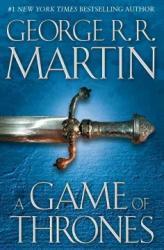
“A Game of Thrones” by George R.R. Martin tells the tale of various clashing households and their quest to conquer control over the seven kingdoms. Set in a distant, but vaguely familiar medieval-Europe, the story bears parallels to England’s “War of the Roses,” while also introducing its share of unique fantasy elements. As the reader progresses through the book, they follow the politics of the Iron Throne- a metaphor representing the complete and utter control a King possesses in a feudal government system. Furthermore, the reader tracks 8 character perspectives, which are alternated through passing chapters.
As the King rides north to Winterfell to meet with his trusted vassal, and friend, Eddard "Ned" Stark, he strikes up an agreement to anoint Eddard as the hand of the king. Reluctant, Ned follows the King back to the South, but as the plot continues to unfold, Eddard learns of a secret unbeknownst to the King and some of his most trusted advisers. With the death of the King and the ruin of Eddard’s house, war rages in Westeros- as several characters attempt to strike their claims on the Iron Throne.
I initially picked this book up after finishing J.R.R Tolkien’s, “Lord of the Rings” series and have been pleasantly surprised with it. Many fantasy readers have speculated that the literary masterpiece of Tolkien’s novels could not be out done, but I am now inclined to disagree. I thought the book was well-crafted and engaging as an intermediate to advanced reader. However, I would file the complaint that the book moves a bit slow for my taste. Some may lose interest in its plot, especially considering the sheer volume of the book series. The old-language also adds to this effect, as it may cause some readers to struggle following along.
Overall, I would say that this book is certainly worth a try for someone who enjoys medieval-fantasy novels. Admittedly, it will take a while to read and is certainly no small undertaking, but by sticking with it, I found myself enjoying every page more than the last!
Grade 10
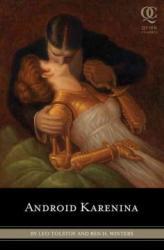
Despite struggling through both Pride and Prejudice and Zombies and Sense and Sensibility and Sea Monsters , I was pleased to find the most lengthy of these “monster classics,” Android Karenina, was a fast and engaging read.
If anything, it proves to me that I can’t grasp Jane Austen’s writing style nearly as smoothly as I can Leo Tolstoy’s. Part of the ease of reading Android Karenina probably came from knowing the original plot ahead of time a little better than I did for Pride and Prejudice and Sense and Sensibility . And yet, the real reason is more visceral than that.
What Android Karenina’s predecessors attempted was to take two vastly different genres and mash them together in the hope that the combination would interest readers. Where Android Karenina succeeds where the others have failed is that the addition of the steampunk/science fiction genre enhances the story. Adding zombies or sea monsters to a romantic story to liven up the boring sections merely accentuates where these boring parts are. When the robotic-themed changes to a piece of classic Russian literature directly enforce the overt themes of the rise of communism, then the story becomes much more compelling.
Granted, some of the source material can be easily implied past the steampunk coverings, but that’s always been the case with these “Quirk Classics.”
At the very least, the pacing of this story kept my interest throughout and rarely dragged itself down via the “drama” of aristocratic gossip and endless discussion of potential marriage partners. But again, this is likely the outcome of adapting Leo Tolstoy instead of Jane Austen. After reading this book, I certainly want to go back and read the original Anna Karenina , even despite the hefty page count.
An enhanced version of Tolstoy’s original in more ways than one, I give Android Karenina 4.0 stars out of 5.
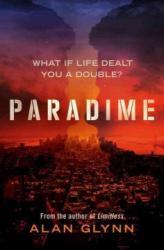
The first time I was introduced to Alan Glynn’s writing was through the
film, Limitless (2011), which itself was based off his first novel, The Dark
Fields. While I enjoyed the film for its visuals, what really struck me as
interesting was the storytelling and characters Glynn created. Now fifteen
years after his first standalone novel, Paradime continues to show Glynn’s
talent in creating engaging plots and characters. Since I really enjoyed this
book, I will do my best to review it without spoiling it for anyone.
At its most simple level, Paradime is a modernized retelling of Mark
Twain’s The Prince and the Pauper, or at least half of it anyway. Told from
the perspective of an out-of-work and out-of-luck cook, Danny Lynch, the
pacing of each of the three acts is steady and intense. Even if some of
Danny’s vocabulary seems a little advanced at times, he is the perfect
“everyman” to convey his peculiar circumstances to the reader. Those
familiar with Limitless will probably see many parallels between the two
stories, with the main exception being how the story ends for Danny.
Glynn’s writing style is very natural and easy to read in this modern
thriller. Each chapter left me wanting to read more and I found myself having
difficulty stopping because the pull of the plot was so intense. I also
appreciated the ability of Glynn to tie things up in an almost unexpectedly
expected way so that no detail in this book was left unused. While this may
have been the first time I’ve read anything by Alan Glynn, I am now
certainly a fan and will have to go back and pick up his other books to read.
A fast-paced and thrilling read, I give Paradime 5.0 stars out of 5.
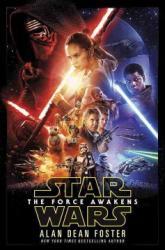
If you’ve been following along recently, you’ll know that I’ve been on
a bit of a “movie” kick when it comes to the audiobooks I’ve listened
to. While there are plenty of movies based on books, I haven’t really been
one to read novelizations of movies. That being said, I’ve found the
writing style in my own novels to be a bit of a novelization of the ideas in
my mind, since I usually try and describe scenes in a cinematic way. At any
rate, I was expecting a story that held close to the film, and this book
certainly delivered on that promise.
I’ll admit that the more I think about the plot and characters of The Force
Awakens, the more I find that it almost exactly matches the events of A New
Hope. However, there were some weaknesses in the first installment of the
Star Wars franchise that I feel are addressed in this recent installment.
Sure, all the elements are there, but they’ve been mixed around into
different characters, settings, and conflicts that add a bit more depth to
the story than the archetypical one presented in A New Hope. As a reboot, The
Force Awakens does an excellent job of calling back to what made the original
great, but doing so in a way that is still different enough to provide
interesting twists and questions.
One thing I do like about this version of the story, compared to the movie,
is the “deleted scenes” that help explain some of the plot holes from the
film. Maybe these scenes hindered the flow of the movie (or weren’t
important enough to include) but they certainly helped me understand the
story a lot better now that I know about them. Finally, while I know that
many films have “enhanced audio” for blind people, I’d almost recommend
these people listen to this audiobook instead. The music, sound effects, and
even many of the actors’ voices all are used at a pace that’s much slower
in order to really grasp what’s happening with the story.
A fantastic audiobook that faithfully captures everything (and more) that
made the film great, I give Star Wars: The Force Awakens 4.5 stars out of 5.
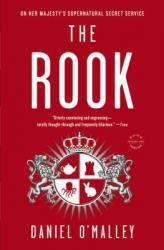
One of the nice things about listening to audiobooks from my library (via the
Overdrive app), is that I can pick up a book and listen to it without really
knowing what it’s about other than a title and a cover. In this way, I
often have no preconceived notions about the book other than first
impressions. At this point, all I’m giving up to “read” the book is the
time it takes me to listen to it, and I have plenty of that driving to and
from work every day.
Since I had no idea what this book was really about, I was surprised at how
humorous it was. If I were to combine a few, better-known series together,
I’d say this is X-Men mixed with James Bond, with just a dash of Jason
Bourne all blended together in Monty Python’s Flying Circus. An odd
combination, I know. But somehow, it works here. The humor is markedly
British, but the characters and their powers are supernatural, to say the
least. Since this was merely the first in a developing series, I can’t wait
to get to book #2: Stiletto.
All this being said, there were a few structural choices to this book that I
often found confusing, which may just be part of listening to it in audiobook
form instead of reading it. First off, the decision to have the main
character afflicted with amnesia was an interesting way to essentially give
the audience what the character already would have known but had conveniently
forgotten. Secondly, because the letters from her former self were used as
backstory, these “flashbacks” were often confusing because it was easy to
lose track of which Mfwany Thomas (glad I had the audiobook for the
pronunciation of this name) was “speaking” at the moment.
An interesting premise with plenty of potential in future iterations, I give
The Rook 4.0 stars out of 5.
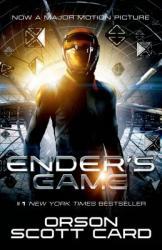
In another “lapse” of my reading habits, I didn’t manage to read
Ender’s Game until the movie of the same name came out in 2013. At the
time, all the sci-fi fans were eagerly anticipating a film that had taken
over 25 years to finally become a reality. While I thought the movie was
quite well done and engaging, after I read the book, I can understand why
some of the diehard fans of the series were disappointed. As is usually the
case with book-to-movie transitions, sub-plots often find themselves on the
cutting room floor. Of course, I don’t blame them for cutting what they
did; after all, it is called Ender’s Game.
Even though watching the movie first spoiled the exciting twist of the ending
when I read the book, I almost read the book differently knowing how it would
turn out. I could see the signs leading up to the shocking reveal, almost as
if I had read it before. I did appreciate the sub-plot with Ender’s
siblings and their efforts back on Earth as their brother was winning the war
in space. If anything, it helped to break up the intense action surrounding
the eponymous main character so that the reader could fully absorb what was
happening in the universe on a political level as well as a military one.
It is disappointing that there will likely be no more movies in this series
since the source material is full of interesting ideas that I’d like to see
on the big screen. Perhaps the series would be better suited for a television
show (a la Game of Thrones) to fully include all the different elements that
made it a classic of sci-fi back in 1985. Either way, I look forward to
exploring more of Orson Scott Card’s universe in the next book of the
series: Speaker for the Dead.
A fantastic sci-fi story with an incredible twist ending, I give Ender’s
Game 5.0 stars out of 5.

What a world we live in! It’s exciting to see a self-published book receive
such attention, eventually becoming a New York Times bestseller! Truly, if a
writer is talented enough with a good enough story, they can make it in this
over-saturated market. And while some of my love for this book comes from my
hopes of eventually being “discovered” as a self-published author, most
of it comes from my love of scientific realism in fiction. Truly, this is
more of a challenge than world-building in a fantasy genre, because in order
for it to be believable, it must obey the laws of physics.
But let’s get down to brass tacks here. There is no doubt that Andy Weir
did his homework on this book. In fact, some sections almost read like the
output section of a very complicated spreadsheet (which I certainly
appreciate, on a personal level). Even with the technical detail to keep the
story grounded in science, the successive cause-and-effect events that
eventually lead to the climax of the story give the reader equal amounts of
elation and heartbreak right along with the protagonist, Mark Watney. Still,
the problem solving accomplished in this novel merely proves how smart we are
as a species today, and how the vast knowledge of the universe has catapulted
us into the very realistic scenario portrayed in the pages. In fact, Weir’s
methodical approach really gives the reader a scale of how big an operation a
trip to (or from) Mars would be.
Even though the science is front and center, the whole reason we read these
almost intimate logs of a Martian astronaut is because the characters are so
well written. With a humor and spunky attitude that help alleviate his dire
situation, Watney almost comes across as a genius “everyman” in that most
of his solutions could be arrived at with a little bit of thought and
ingenuity. And while the majority of the book centers around Watney’s logs,
every minor character has a depth and expertise that helps to propel the
story forward.
A fast and fun read full of excitement and ingenious science solutions, I
give The Martian 5.0 stars out of 5.
For more reviews of books and movies like this, please visit
www.benjamin-m-weilert.com

From the title of this book, I would have expected it to be about the
aftermath of an apocalypse-inducing event. If anything Echo of the Boom is a
misnomer and the book should be titled Prelude of the Boom. The cover also
doesn’t give much into what it’s about, other than the four different
points of view which are followed throughout the narrative.
While I did eventually like the book, it took too long to get there (some of
the occasional typos didn’t help me get into it either). With the
characters’ motivations unclear from the start, it becomes obvious about
150 pages in that nothing is really going to happen in this book. Instead of
having any driving force propelling the characters forward, it’s more
accurate to describe this book as a nearly 500 page rap battle. Each
character has their own track, living their lives the way many teenagers
today might (which in itself is a scary thought), but occasionally the tracks
mix together albeit briefly and with little perturbation to the individual
characters. At least the words the author uses are artistic and articulate,
making it fun to read.
Honestly, the very last sentences of this book made me want to read what
happens next much more than what had already been written, since it sounded
like it was going to be much more interesting than the origin stories of
these characters. If the author’s opinions and worldviews weren’t so
blatantly obvious through this book, it might have been interesting as a
“slice of life” novel, but at least he has something to say (even if
it’s regularly redundant). If anything, this book should give parents the
motivation to be more actively involved in their teenagers’ lives, lest
they end up with the motivation to destroy all systems of authority if for no
other reason than pure anarchy.
A rewarding read that takes some getting used to; I give Echo of the Boom 4.0
stars out of 5.
For more reviews of books and movies like this, please visit
www.benjamin-m-weilert.com
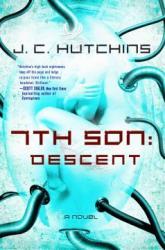
I managed to find this book on a table full of free books at a convention some time ago and tucked it away in my “to read” pile. Now that I’ve finished most of the Goodreads giveaways I have received, I decided to give it a read. With nothing other than the title (which doesn’t tell me much) and the cover (which gives a little more information), I honestly didn’t know what to expect from this book. Since it was on a table of free books, I didn’t have much expectation for it, but boy did it ever deliver!
With a fantastically engaging idea and a blisteringly fast execution, 7th Son: Descent pulled me in from the get-go and wouldn’t let go. Action! Espionage! Science! Without ever becoming too mired in the details (but providing enough to have the plot make sense), this book successfully made a story about cloning that wasn’t trite or cliché. The ideas and characters contained within were unquestionably too big for this book since it introduced many subplots but never concluded them. Still, there was enough of a conclusion to this book to leave me satisfied without it being too much of a cliffhanger.
My one qualm with 7th Son: Descent, other than the brief, horrifying moment of implied violence involving a pneumatic socket wrench, was that there were almost too many characters. I understand that there needed to be a well-rounded group of clones, but I honestly couldn’t tell you anything significant or memorable about at least two of them. I mean, you have the free-spirited musician, the conspiracy-nut hacker, the gay marine, the priest, and the egomaniac criminal psychologist, but I guess the U.N. employee and the other guy (I can’t even remember what he did) didn’t stand out to me. Maybe they play a bigger role in the later books, but they seemed undeveloped in this one.
An excellent, action-packed science fiction book that left me wanting more, I give 7th Son: Descent 4.5 stars out of 5.

When I first heard about Ready Player One (2011) years ago, I was excited an author would even try to capture the spirit of the hardcore pop culture lover. After I received a hardcover copy of that book for Christmas, I devoured every word and loved every moment of it. This was why, when I saw Ernest Cline had written another book appearing to be in the same vein of Ready Player One, I had to buy it and give it a read. This book was Armada.
Unfortunately, I was not nearly as impressed with Armada as I was with Ready Player One. In Armada, the pop culture references were there, but almost to the point of oversaturation. There were plenty of references I didn’t understand because I haven’t encountered the source material, which was somewhat frustrating. Furthermore, what made the references entertaining and fun in Ready Player One was that they were tied to unravelling the mystery and linking each clue to the next one; in Armada, they were merely the mating call of the nerd.
And while Armada has a few scenes of immersive action that are incredibly well written, the plot is quite lacking. The first “reveal” (if you can call it that) was predictable and the motivations of the antagonists were weak at best, almost as if he had written himself into a corner and didn’t know how to resolve the story in a satisfying way. In fact, the huge numbers of pop culture references actually made the story seem less original, as it pretty much came across as Ender’s Game (1985), and the narrator told you as much.
A story with a potential it never quite lived up to and a shadow of the author’s previous book it could never come out from underneath, I give Armada 3.0 stars out of 5.
For more reviews of books and movies like this, please visit www.benjamin-m-weilert.com.
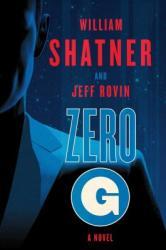
***THIS BOOK WAS RECEIVED FROM A GOODREADS GIVEAWAY***
William Shatner, best known for his acting in the popular sci-fi series, Star Trek, is not someone who I thought would also be a writer. Of course, after reading Zero-G, I’m still not convinced, even with the help of ghostwriter Jeff Rovin. The book had an interesting premise, but the exposition and plot were so slow and clunky that it was hard to get into it. I will say there is an appreciation of the challenges of space in this book, but it almost plays a backseat to an aged government official trying to relive his glory days (sound familiar?).
If I were to re-write this book, it would have been considerably shorter, possibly even a short story. As it is, the first third of the book is almost useless, filled with detailed explanations of the characters’ backgrounds and relationships. Even the first action sequence only emphasized that the main character is reckless and flies by his own rules. When it came to the core of the plot, I never felt a sense of urgency to take out the threat of the space-weapon, mainly because it acted “randomly” (read: whenever it might suit to move the plot along).
For a book about an FBI station in space, the mystery solved by the deputy director seemed quite a bit beneath his station. In fact, I was surprised he even handled it since the whole case appeared to be obvious right from the start. There wasn’t enough development of the lesser characters to even know who they were and why they had any motivation to perpetrate the crimes they did. Aside from the main character, most of the character focus appeared to be on the gender-switching assistant, probably to make the book “hip” and “trendy” amongst the modern and liberal-leaning readers.
An interesting concept that falls flat on its face immediately after the prologue, I give Zero-G 2.0 stars out of 5.
For more reviews of books and movies like this, please visit www.benjamin-m-weilert.com



 Ruth Holley Library will be temporarily closed for approximately one week starting Mon., Dec. 2 to complete roof repairs.
Ruth Holley Library will be temporarily closed for approximately one week starting Mon., Dec. 2 to complete roof repairs.